
But epinephrine is also a medicine. Called synthetic epinephrine, it acts in pretty much the same way as the hormone. Read ahead to learn more about the merits of having epinephrine in your first-aid kit. (h/t to PrepSchoolDaily.Blogspot.com)
Conditions treated using epinephrine
Epinephrine is used mainly to treat the following conditions:
Severe allergic reaction
Epinephrine, in the form of an auto-injector, is one of the most common first-aid medications for anaphylaxis — a severe, life-threatening allergic reaction commonly caused by allergens like bee stings, peanuts, latex and certain drugs. In an anaphylactic reaction, a patient's breathing becomes compromised, the chest tightens and blood pressure levels drop suddenly. Anaphylaxis symptoms include a rapid and weak pulse, fast heartbeat, skin rash, hives, nausea, vomiting and wheezing.
Once these symptoms appear, epinephrine injection must be administered promptly. However, it should not be substituted for medical treatment. After injecting epinephrine, go to the nearest hospital and rest while you wait for emergency medical treatment.
Excessive bleeding
Epinephrine can also help stop bleeding. It is a vasoconstrictor, meaning it contracts your blood vessels. When used for wound care, it is usually combined with lidocaine, an anesthetic, in a one to two percent solution. But epinephrine should not be used for injuries on the fingers, toes, nose or ears because it may completely cut off circulation. People on beta-blockers (drugs that reduce blood pressure) should also avoid using epinephrine.
Croup
Croup is a lung infection that causes swelling around the vocal cords. Most active during the fall and winter, it usually affects children under the age of five. Common symptoms include sneezing and runny nose, fever, barking cough, heavy breathing and hoarse voice.
Croup caused by a virus typically goes away on its own. But if symptoms are severe and persist for more than three to five days, contact a health professional. A dose of steroids is usually administered for severe cases. In the absence of steroids, epinephrine can be used as an alternative. It is commonly nebulized (converted from liquid to mist) to come into contact with the vocal cords. If you're using epinephrine tablets, these can be added to a pot of boiling water.
Should you keep epinephrine in your first-aid kit?
Health practitioners administer epinephrine to patients with a history of anaphylaxis. If you have allergies or are bugging out with someone who has, visit a health professional to get medical advice about the matter.
Some experts recommend keeping an epinephrine vial even if you have no known allergies. But if you're cash-strapped, it would be best to use your money elsewhere. You can rely on bandages, tourniquets and other common first-aid items to treat wounds. Meanwhile, you can explore natural remedies for croup, such as eucalyptus oil and tea tree oil. If you decide to keep epinephrine, consult a health professional first. Epinephrine injections require a prescription. (Related: Survival medicine basics: How to use sugar to treat wounds.)
Keep in mind that epinephrine in liquid form does not have a long shelf-life. It usually expires after a year. However, it does not automatically go bad once they hit their expiry date. Its efficacy decreases, but it can still be a life-saver if you suddenly experience an allergic reaction. Just store your epinephrine shot in a cool, dry place and keep it out of direct sun exposure.
Keeping epinephrine in your first-aid kit will be beneficial especially if you perceive allergies to be a threat to your safety. But do not confine your choices to epinephrine alone. Explore natural remedies and be sure you have all the first-aid basics.
Sources include:
Please contact us for more information.























